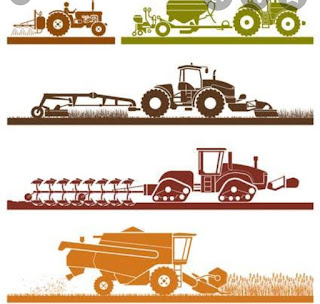Farm Machinery Custom Hiring Centre (CHC) -Business Model (कृषि मशीनरी किराये पर देना)
Farm Machinery Custom Hiring Centre (CHC)
-Business Model (कृषि मशीनरी किराये पर देना)
Agricultural mechanization is an important input to achieve higher productivity and mitigate costs in the agricultural sector. Availability of farming labour power is reducing. Reduced cost of production (including labour) + Increased Productivity, Increased Farm Income factors, including diversion of labour into other employment generation programs of the government. Even when available, it may not be available when needed and at affordable price to the farmer.
Mechanisation of farming/agriculture needs to include past learning, as it can lead to intensive cultivation, and negatively impact on long term sustainability. Research & Development activities on agricultural mechanisation on various farm operations and their possible outcomes is needed. Similarly, to ease the pressure of cost of machinery, local engineering and prototype development needs to be scaled up. Agricultural mechanization plans, must include farm waste management machines, so that farming residue is not committed to uneconomic disposal but becomes a viable off take from farming.
The cost component of other social and environmental ramifications must be incorporated into such planning. Access to mechanized tools, to small land parcels, is best promoted through developing common use assets at Custom Hiring Centers and Agriculture Machine Banks. As the demand for such equipment develops, these Centers can also rent out more comprehensive package of services. This will also be a mode of employment to skilled operators in the region. Farmers, who are skilled operators themselves, can find secondary income as operators once their own farm has been serviced.
A number of professional service providers have emerged in the country catering to agricultural mechanisation on the principle of ‘Pay Per Use’ (PPU). These service providers offer a range of services on demand from the farmers. Since they serve a large hinterland, they can affordto make huge investments of about Rs.200 lakh and manage to break even within 2-3 years. Going beyond machinery, they also cater to other facilities like labour etc. It is possible to use the brand equity of such professional service providers and expand agricultural mechanisation via the franchise route. Such decentralised franchise holders can then improve service efficiency by combining their own machineries and deploying machineries owned by others including individual farmers on rentral mode.
The concept of aggregation platform already common in city taxi service can be replicated in agriculture machinery sector. City taxi services like Uber, Ola are household names globally. Uberisation of agriculture machinery is a win-win situation. To the individual owner, this helps in finding usage, when he does not need it and to the franchisee, the advantage is that he can expand his business with lower order investment and also increase the platter of services on offer.
To the farmer not owing machinery, the advantage lies in availing of services without the bother of procurement, operation & maintenance and acquiring needed skills. Looking at the pattern of land holding in India, about 84 per cent of the holdings are below 4 ha. In this scenario of operational holdings, the individual ownership of agricultural machinery is made uneconomic and operationally unviable. The solution is to set up ‘Agriculture Machine Banks’ (AMBs) and ‘Custom Hiring Centres’ (CHCs) of agricultural machineries to allow small & marginal farmers access to powered machines, without the need to own the asset themselves. These Banks and Centres can be operated by Co-operative Societies, FPOs or VPOs, NGOs, Trusts, as well as private entrepreneurs and as CSR (Corporate Social Responsibility) activities.
The Govt recommends a target of at least one custom hiring centre (CHC) in every large village or Gram Panchayat (GP) in case of small villages. The custom hiring centre should typically house the low order machines needed to suit the crops and production systems in that village. The recommendation does not restrict more than one such centre in a village and multiple such centres can be welcomed, depending upon crop area, cropping intensity and other likewise needs for mechanised support for agricultural works.
The Government of India is promoting agricultural mechanisation on farms through a Sub Mission on Agricultural Mechanization (SMAM) of Rs. 2000 crore.
My Social media Links Below:-
Instagram: https://www.instagram.com/manmath.biradar/
Twitter: https://twitter.com/BiradarManmath
Small farm mechanization through Custom Hiring Centres for farm machinery Vikaspedia,
CHC Farm Machinery - Apps on Google Play,
Agricultural Machinery Custom Hiring Centres - TNAU Agritech Portal,






Comments
Post a Comment